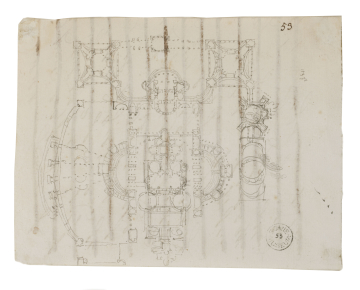Inscribed
Inscribed in ink on drawing 53
Signed and dated
- Undated, probably 1755 - 1756
Medium and dimensions
Pen127 x 167
Hand
Robert Adam (attributed to)
Verso
Inscribed in ink in Robert Adam's hand with part of one side of a letter of fifteen lines, each scored through in ink.with the Reasons Jamie gave for / particularly from his views of / and which I think was most chymical / not to succeed in England what I am to / to Scotland & the English are so / ay either be engaged with Chalmers / -- -- -- -- may change / -- -- for Italy. Besides had / and -- any such Intention, or had I -- -- -- ready to remove / he ---d to himself in opposition /-- -- But was the whole Affair / My head & in order to say anything / -- -- -- my once the / -- which I have no patience
Notes
The small scale of the plan and thin draughtsmanship are close in style to that of Laurent-Benoít Dewez (1731-1812), but the letter on the verso suggests that the sheet was re-used (there are remains of a landscape composition on the recto) and Robert Adam's hand is the more likely. The composition of the plan may be compared with Adam vol.9/39, and the inspiration of such complex planning can be seen in the antique style of Adam vol.9/43. The letter on the verso appears to be concerned with Robert Adam's career, with references to Scotland, England, Jamie (James Adam) and Chalmers. This latter is likely to be William Chambers, whom the Adam family was called by the name of Chalmers in this period, John Adam referring to him as 'Mr Chalmers' in a letter of 1756 (see J. Fleming, Robert Adam and His Circle in Edinburgh & Rome, London, 1962, p.359). The letter here is probably of the same date and appears to be in Robert Adam's hand. The remaining curved corner of the sheet is similar to those at Adam vol.57/81-84, depicting Roman views, which suggests a similar small sketchbook as the source.
Level
Drawing
Digitisation of the Drawings Collection has been made possible through the generosity of the Leon Levy Foundation
Sir John Soane's collection includes some 30,000 architectural,
design and topographical drawings which is a very important resource for
scholars worldwide. His was the first architect’s collection to attempt to
preserve the best in design for the architectural profession in the future, and
it did so by assembling as exemplars surviving drawings by great Renaissance
masters and by the leading architects in Britain in the 17th and 18th centuries
and his near contemporaries such as Sir William Chambers, Robert Adam and
George Dance the Younger. These drawings sit side by side with 9,000 drawings
in Soane’s own hand or those of the pupils in his office, covering his early
work as a student, his time in Italy and the drawings produced in the course of
his architectural practice from 1780 until the 1830s.
Browse (via the vertical menu to the left) and search results for Drawings include a mixture of
Concise catalogue records – drawn from an outline list of the collection – and
fuller records where drawings have been catalogued in more detail (an ongoing
process).


